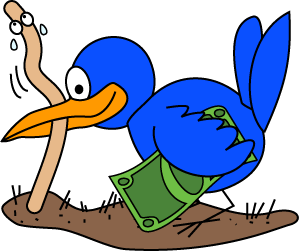

The melatonin-implanted birds did not sire as many birds, both within their social pair and outside of it. With mixed up melatonin levels, one group of birds in the study was slightly confused about when the day started, experiencing unnatural continuous night-like melatonin levels both day and night. In the 20 field seasons, all nest boxes were checked regularly for active nests and followed through incubation and nestling rearing. Data was recorded from 10 control implanted and 9 melatonin implanted birds. Their daily activity patterns were recorded in the field for up to 19 days. The birds in the study were males living in an established nest box population near Radolfzell, Germany. "Our data suggest that making sure you are active before the females may impact the number of offspring you sire with your mate." If you are not around when she becomes active, she may seek opportunities from neighboring males," said Greives about results of the study. "This study suggests that being active during this pre-dawn period may be important for not only gaining reproductive success through extra-pair mating attempts, but may also be important for copulating with your mate. Further, we found that males that received an implant filled with melatonin were more likely to be found raising young in their nest that had been sired by another male," said Dr. "We found that birds that received the implants filled with melatonin woke up slightly later than birds that received an empty implant. Radio transmitters on the birds allowed tracking and blood samples confirmed paternity. The pattern of nightly hormone release results in tuning of the bird's body clock. The release of this hormone is inhibited by daylight.

Melatonin is a hormone that is released from the pineal gland in the brain, during the dark of night. In the study, one group of birds received small implants of tiny, flexible tubes containing melatonin to change their body clocks, while another control group did not. Researchers included: Michaela Hau, Max Planck Institute for Ornithology, University of Konstanz Sjouke Kingma, University of East Anglia, University of Groningen Bart Kranstauber, Max Planck Institute for Ornithology Kim Mortega and Martin Wikelski, Max Planck Institute for Ornithology, University of Konstanz Kees van Oers and Christa Mateman, Netherlands Institute for Ecology Glen Ferguson, National Bioenergy Center and Giulia Beltrami, Università di Ferrara. Timothy Greives, assistant professor of Biological Sciences at North Dakota State University, Fargo, North Dakota, USA, served as lead author of the study.

In "Costs of sleeping in: circadian rhythms influence cuckoldry risk in a songbird," researchers from the United States, Germany, United Kingdom, Italy and the Netherlands tracked the songbirds Parus major (commonly called great tits) and their nests in Germany over a two-year period. You could call it the "you snooze, you lose" effect. The early risers used that time to mate with other birds not in their social pair. Researchers found that birds that start their day earlier father more offspring. Results of this study provide insight into the evolution of the body clock. Most organisms - including humans - experience daily rhythms driven by a body clock.


 0 kommentar(er)
0 kommentar(er)
